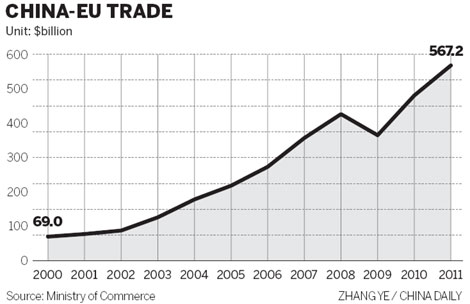 |
|
|
|
|||||||||||

AEA members vote Belgium as being top investment destination
Non-tariff barriers deserve more attention, and Chinese companies should pay more attention to intellectual property rights when it comes to trade and investment, said Steven Vanackere, Belgian deputy prime minister and finance minister.
China is Belgium's second-largest trade partner outside the European Union, while Belgium is China's sixth-largest trade partner within the EU.
"Trade barriers as a general factor need to be diminished. But it is very important for countries to have a good look at non-tariff barriers. In some terms, they are more important," he said.
The recent anti-dumping and anti-subsidy investigation launched by the EU against Chinese goods is one form of non-tariff barriers, while others include imports quotas, strict certification and high technical standards.
But blaming the Belgian government would be in vain, as most of the country's trade regulations and decisions emanate from the EU, said Haiyan Zhang, a professor at Antwerp Management School.
Vanackere made the comments recently while meeting about 50 visiting Chinese entrepreneurs from the Aigo Entrepreneurs Alliance, or AEA, a group of about 100 privately owned enterprises eager to enter the Belgian and European markets.
"I want to express on behalf of the Belgian government and people, that you are very, very welcome," Vanackere told the visiting Chinese businesspeople.
He said that by setting foot in Belgium, the heart of Europe, companies can easily access the European market.
Brussels, the headquarters of the EU, is also home to hundreds of international professional federations, and the headquarters of 1,300 international companies.
"This is the place where you get in touch with global decision-makers," he said.
Vanackere added that Belgium's affordable living and housing costs, and a highly qualified workforce also made the country more attractive to investors.
Belgium was voted as the AEA's top investment destination after its representatives visited Belgium, the Netherlands, the United Kingdom and Denmark last year.
Vanackere said "having new growth" is a priority for the government, which is why he and his country are particularly happy to see Chinese investment.
Belgium's sovereign rating was downgraded by Standard & Poor's Financial Services LLC last November for its relatively high debt level, weakening external demand and a political deadlock that left the country without a fully fledged national government for more than 500 days.
That situation ended in December, when a government was formed by Prime Minister Elio Di Rupo.
Vanackere said the new government was able to make the right decisions about budgets and fiscal matters.
"I'm glad to say that if you look at the economic growth, it is above the European average, which shows that if you restore confidence among businesspeople and citizens, you can re-establish growth," he said.
"So I'm quite optimistic about our capacity to settle our problems on the budget front, as well as on new growth."
Though foreign investment is seen as crucial for this "new growth", and is embraced with enthusiasm, the deputy prime minister reminded Chinese companies to take intellectual property rights very seriously.
"One of the key things that I want to ask my Chinese friends is to take into account the importance of intellectual property rights. Business in Belgium is very innovative. They want to be able to profit from their innovative efforts," he said.
"It is important that Chinese friends work on the further improving of protecting the interests of Belgian companies when it comes to innovative technologies, which for Belgian politicians, is a very, very important point," he said.
The visiting Chinese businesspeople seemed well aware of their host's concerns.
Feng Jun, chairman of the consumer electronics maker Aigo Digital Co Ltd, and founder of the AEA, assured Vanackere that the alliance's members will comply with local laws and "common moral standards".
He compared immoral corporate practices to the doping of athletes during the Olympic Games and said there will likewise be "zero tolerance" of such acts.
Large Chinese companies, such as Geely Automobile Holdings Ltd and Huawei Technologies Co Ltd, have already established a presence in Belgium. But AEA members, who are mostly small private companies, are still testing the waters.
"Of course, we are eager to tap the market, which is why we are here. But we have to make a lot of things clear before making decisions," said a chairman of a metal company who refused to be named.
zhengyangpeng@chinadaily.com.cn